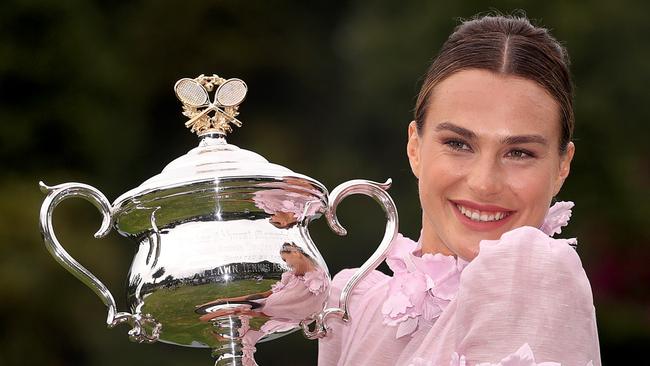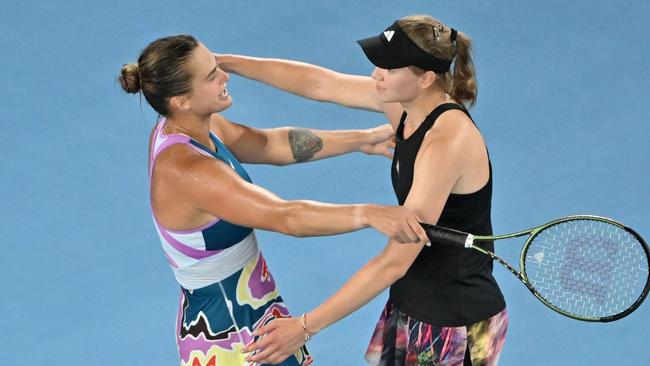Power struggle between Sabalenka, Rybakina signals new era in women’s tennis
Ash Barty said goodbye to her Australian Open trophy on Saturday night. She was an artist. The new mob? It’s a demolition job.

The big screens on Grand Slam Oval were showing a replay of Ash Barty’s Australian Open triumph in the hour before Aryna Sabalenka’s victory. Folks were sipping champagne and partaking of fine wines and guzzling beers and roaring for Barty as though that magical match was being shown in real time. I wasn’t expecting to get goose bumps all over again … but I got goose bumps all over again.
I’d forgotten how soul-stirring Barty had been. Forgotten about her red shoes. Forgotten about the truly ebullient, nervous, excited, ultimately joyful crowd crammed inside Rod Laver Arena that night. Forgotten about the delicate drop shot followed by the leaping smash at 3-0 in the second-set tie-breaker that basically meant she was home and hosed. Forgotten about one spectator in particular, the gloriously cheerful bloke a few rows back with the large Indigenous flag, beaming like the moon. I’d forgotten about Barty’s confusion at 5-1 in the tie-breaker – you have to change ends now, darl.
I’d forgotten about Barty’s eyes as big as saucers before match point. I’d forgotten about the two sliced backhands and then the hooked crosscourt forehand winner to become Open champion. I’d sort of forgotten about the raw intensity of her full-throated, fist-clenching, guttural celebration, like all her self-doubts could go and get stuffed. I’d forgotten about the staggeringly powerful reaction from a polite young woman who went on to describe the whole thing thus: “Really unreal.”
Now Barty’s about to become a mum. Unreal. The world of tennis moves on. More unreal than expected. Barty was glowing at Melbourne Park on Saturday night, parading the trophy to another standing ovation before it was handed over to Sabalenka, the player Barty used to torment with slices, dices, cuts, angles and all-court aplomb. The Belarusian’s gruelling 4-6 6-3 6-4 victory over Elena Rybakina produced another great reaction: she lay flat on her back, exhausted, relieved, disbelieving, trembling, weeping, having an almost-out-of-body experience after swinging out of her shoes all night.
“Proud. I don’t know how to explain. Just the best,” she said.
“Is the best day of my life right now. I kept telling myself that nobody tells you it’s going to be easy. You just have to work for it. Work for it until the last point. I was able to handle all those emotions and win. Super happy.”
What do we have post-Barty? The demolition era. The towering, glamazon figures of Sabalenka and Rybakina were wrecking balls with forehands. Nobody’s forgotten about world No. 1 Iga Swiatek. The surge of Sabalenka and Rybakina is the worst and best thing to happen to the Pole. The worst? Adding to her three major titles won’t be easy. The best? She has genuine rivals to push her to be better than she is right now. If the future of women’s tennis is the 24-year-old Sabalenka versus the 23-year-old Rybakina versus the 21-year-old Swiatek, sign me up. Fire versus ice versus a little bit of both.
Demolition era: Sabalenka and Rybakina clubbed the ball from beginning to end. Their peak serving speeds were 190km/h. The difference? Sabalenka stuck to her guns and became more aggressive. Rybakina became ever-so-slightly careful and it cost her. It was like the huffing, puffing, groaning, grunting Sabalenka wanted her first major title so damn much that nothing would deny her.
Rybakina played in a dignified, Barty-esque silence and had most of the crowd on her side but when Sabalenka finally fell over the line in a puddle of sweat and elation after two hours and 28 minutes, the mood inside RLA became … oh, good on her.

She cried a Yarra River, hugged her entourage, including coach Anton Dubrov, who wanted to quit when they were speedily going nowhere last year. “He just said, ‘I don’t know what to do. I think you need to find someone else who’s going to help you’,” Sabalenka said. “But I knew that it wasn’t about him. It was just something about me. I just had to figure out the problems. Like, we have to get through it together. I’m really happy that we kept working. We went through so many things together. It’s even sweeter that we get this as a team. It’s been a long journey for us. We are here now with the grand slam title.”
Sabalenka’s double-fault on the first point was like the shower scene from Psycho. This was about to get ugly. But she ignored her well-documented serving problems and overcame her past psychological demons of inferiority and self-doubts.
“I always had this weird feeling when people would come to me and ask for my signature,” she said. “I’d be like, ‘why are you asking for a signature? I’m nobody. I’m just a player. I don’t have a grand slam and all this stuff’. I just changed how I feel. I started to respect myself more. I started to understand that actually I’m here because I work so hard and I’m actually a good player. Just having this understanding that I’m a good player and I can handle a lot of emotions and things on court. Every time I had a tough moment, I was just reminding myself that I’m good enough to handle all this and everything.”
The demolition era. Hitting the ball, hitting the cover off it. Sabalenka occasionally yelped like a woman who’d just stubbed her toe. In really pressure-packed moments, it sounded desperate and pleading, almost painful. Prowling the back court, she kept muttering to herself “fight, come on, fight.” Rybakina gave another match the silent treatment. Her fight was real, too, but understated.
While Sabalenka was fist-pumping and caterwauling, Rybakina would fix her ponytail, gentling patting the strings of her racquet or tapping her thigh, whispering instead of wailing.
Nobody in women’s tennis can hit Rybakina off the court … except Sabalenka. “Aryna played really well, aggressive,” the Wimbledon champion said. “I should have also have been more aggressive in some moments. She was strong mentally, physically. I would say that not many girls can really put me under the pressure but against her, it’s not easy. Her ball is coming very heavy. There’s few girls who play like this. I had opportunities. Didn’t take them.
“As I said, not many powerful players on tour. Maybe this is kind of pushing the other players to be more aggressive. I don’t know what to say any more, guys. I’m too tired.”
Bye-bye to Barty. Thanks for the goosebumps. And the red shoes. And the backhand. And the slicing and dicing. And the hooked crosscourt forehand winner. Really unreal.
In her absence, the Open started with serious questions hovering over women’s tennis. Swiatek was alone at the top of the pile but now Sabalenka and Rybakina have given the sport what it needed. Big personalities.
The beginnings of big long-term rivalries. Jaw-dropping standards of ballstriking and power. Look at Sabalenka posing with the trophy on Sunday. The glamour doesn’t hurt. Barty was an artist. The new mob? It’s a demolition job.




To join the conversation, please log in. Don't have an account? Register
Join the conversation, you are commenting as Logout